南非共和国宪法
南非宪法全文

[转载]南非宪法全文南非共和国宪法万能之上帝,掌握万邦运命与各民族历史;汇聚吾人来自各地之祖先而予以此土;教之导之,无时或已;免我於危殆,使民永相守,吾人敢不钦遵;今吾等集会於国会,特宣告全国:吾人凛於对上帝与人类所负责任;复深知团结之重要,以保障吾国之完整与自由;以维护法律与秩序;以促进国民之幸福及精神与物质上之利益;愿与举世爱好和平之各民族合作,尽追求和平之责任;并负起建立南非共和国之责,特制定宪法,使适合于本土之传统与历史:为此,南非联邦参议院与从议院,承皇后陛下之批准,订立宪法如后。
第一章共和国第一条南非联邦由好望角、那他尔、特兰斯瓦、奥伦奇自由邦等本宪法未成立前原有之诸省组成,自1961年5月31日起成为一共和国,定名为南非共和国。
第二条南非共和国国民承认上帝之主权与领导。
第三条自第一条规定之日起,凡在宪法成立前订定之法律,而在宪法成立后继续在国会职权内之土地上生效者,其条文内所称之:①南非联邦或国家,应作共和国解释;②王权或国王或王后或总督,视其情形,应作共和国或本国总统之解释;③王在枢密院或王后在枢密院或总督在枢密院,应作本国总统之解释。
第二章国旗与国歌第四条共和国应有国旗,其形式见第五条。
第五条(1)共和国国旗应有三色横条,长宽相等,顶上一条为橘黄色,中间白色,底下蓝色,其中尚有:①中间白色条当中处应嵌有奥伦奇自由邦邦徽,全徽直竖;②在上述奥伦奇自由邦邦徽之两旁:a.在近旗杆之琏应嵌以1927年不列颠联合王国国徽,全幅横置。
b.在离开旗杆之一边,横嵌南非联邦邦徽。
(2)前述a、b两款所嵌两小徽形式大小应相同,宽长之度应与国旗之宽长成比例,即每一徽之宽度应为白色条宽度1/3,b款所示各徽在白色条两旁之距离相同。
第六条定《南非之声》为共和国国歌。
第三章总统第七条(1)总统为共和国之元首。
(2)总统为南非国防军之统帅。
(3)在本宪法规定范围内,总统有下述诸权力:①遵照宪法之规定解散参议院、众议院、或同时解散参众两院;②遵照第二十条与第二十一条之规定任命部长、副部长;③授予荣典;④任命、派遣、接见与承认大使、专使、外交代表及其他外交官员、领事、馆员;⑤遵照本宪法之规定,决定国会会期及休会;⑥凭己意无条件或有条件赦免或缓刑,或取消任何罚款或没收处分;⑦国际会议、条约、协定之加入与批准;⑧宣布或停止戒严;⑨宣战与媾和;⑩在法律秘授权之范围内,总统任命其认为需要任命之官员,并行使及履行宪法与法律所授权之一切权力与职务。
人权法案例分析范文
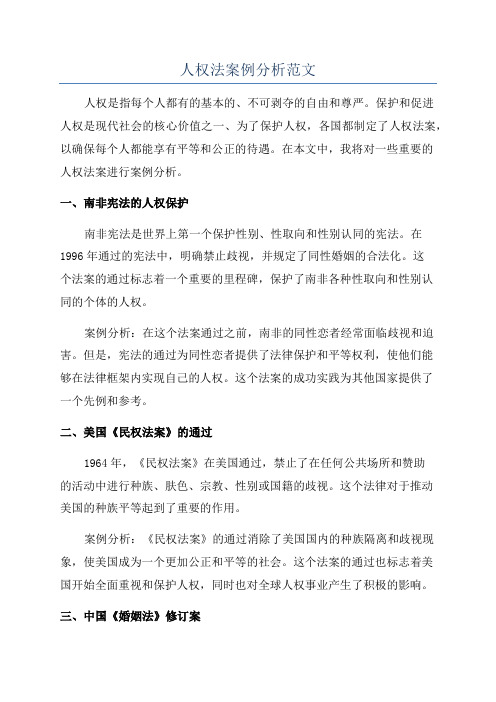
人权法案例分析范文人权是指每个人都有的基本的、不可剥夺的自由和尊严。
保护和促进人权是现代社会的核心价值之一、为了保护人权,各国都制定了人权法案,以确保每个人都能享有平等和公正的待遇。
在本文中,我将对一些重要的人权法案进行案例分析。
一、南非宪法的人权保护南非宪法是世界上第一个保护性别、性取向和性别认同的宪法。
在1996年通过的宪法中,明确禁止歧视,并规定了同性婚姻的合法化。
这个法案的通过标志着一个重要的里程碑,保护了南非各种性取向和性别认同的个体的人权。
案例分析:在这个法案通过之前,南非的同性恋者经常面临歧视和迫害。
但是,宪法的通过为同性恋者提供了法律保护和平等权利,使他们能够在法律框架内实现自己的人权。
这个法案的成功实践为其他国家提供了一个先例和参考。
二、美国《民权法案》的通过1964年,《民权法案》在美国通过,禁止了在任何公共场所和赞助的活动中进行种族、肤色、宗教、性别或国籍的歧视。
这个法律对于推动美国的种族平等起到了重要的作用。
案例分析:《民权法案》的通过消除了美国国内的种族隔离和歧视现象,使美国成为一个更加公正和平等的社会。
这个法案的通过也标志着美国开始全面重视和保护人权,同时也对全球人权事业产生了积极的影响。
三、中国《婚姻法》修订案中国的《婚姻法》修订案在2024年通过,将保护女性权益和促进婚姻平等作为重点内容之一、这个法案禁止家庭暴力、强制婚姻和虐待妻子或丈夫。
案例分析:《婚姻法》修订案的通过为中国社会提供了更好的法律保护,尤其是针对妇女权益的保护。
此外,这个法案还鼓励了男性和女性在家庭生活和职业发展中的平等地位,促进了性别平等。
综上所述,人权法案对于保护和促进人权起到了非常重要的作用。
不同国家的人权法案不仅体现了各国政府对于人权的重视程度,也对全球人权事业产生了积极的影响。
随着社会的发展和人权意识的提高,人权法案也将继续发展和完善,以更好地保护每个人的人权。
南非黑人掌权法律规定(3篇)

第1篇一、引言南非,一个位于非洲南部的国家,拥有悠久的历史和丰富的文化。
在种族隔离政策实施期间,南非的黑人长期遭受歧视和压迫。
1994年,南非举行首次不分种族的全民大选,黑人赢得了政权,开启了南非历史上的新篇章。
本文将探讨南非黑人掌权后的法律规定,分析其历史背景、法律体系以及变革历程。
二、历史背景1. 种族隔离政策自1948年起,南非实行种族隔离政策,将黑人、印度人和有色人种与白人严格分开。
种族隔离政策导致了南非社会的不平等和种族歧视,黑人权益受到严重侵犯。
2. 反种族隔离运动在种族隔离政策实施期间,南非的反种族隔离运动逐渐兴起。
黑人领袖如纳尔逊·曼德拉和德斯蒙德·图图等人为争取黑人权益、结束种族隔离制度做出了巨大贡献。
3. 非国大党崛起非国大党(非洲人国民大会)是南非最大的黑人政治组织,成立于1912年。
在反种族隔离运动中,非国大党发挥了重要作用。
1994年,非国大党在首次不分种族的全民大选中获胜,结束了种族隔离制度。
三、法律体系1. 立法机关南非黑人掌权后,建立了新的立法机关——国民议会。
国民议会负责制定和修改法律,确保国家法律体系的完善。
2. 司法机关南非司法机关包括宪法法院、高等法院和地方法院。
宪法法院负责监督国家法律的合宪性,保障公民的基本权利。
3. 宪法南非宪法是国家的根本大法,于1996年颁布。
宪法确立了南非的政治体制、公民权利和义务,以及国家的基本政策。
四、变革历程1. 宪法改革南非黑人掌权后,首先进行的是宪法改革。
1996年,南非颁布了新的宪法,确立了民主、平等、自由、正义、包容和多元的价值观念。
2. 种族平等法律为消除种族歧视,南非制定了一系列种族平等法律。
这些法律包括《种族平等法案》、《种族隔离修正案》等,旨在保障黑人等少数族裔的权益。
3. 民权法律南非黑人掌权后,还制定了一系列民权法律,保障公民的基本权利。
这些法律包括《人权法案》、《平等机会法案》等。
《南非过渡时期临时宪法》通过

《南非过渡时期临时宪法》通过1993年12月22日,南非议会特别会议以237票赞成、46票反对,通过了南非历史上第一部非种族主义的临时宪法。
这部宪法宣告了南非延续300多年的少数白人种族统治的终结,南非的民主进程取得了突破性进展。
众所周知,南非是世界上唯一用宪法和法律将种族隔离和种族歧视合法化的国家。
南非白人殖民者早在1909年就制定了《南非法》,确立了少数白人在南非的统治地位,使占人口80%的广大黑人被剥夺了基本的人权。
南非国民党在1948年上台后公开宣扬“白人至高无上”,并依靠手中的国家机器统治和压迫广大黑人。
南非白人政府颁布的种族隔离和歧视的法律多达350余种。
广大的南非人民为争取自由,进行了坚持不懈的英勇斗争。
1955年,由非洲人国民大会等组织召开的南非人民大会所通过的《自由宪章》明确提出,要在南非实行各种族平等,所有南非人享有平等的选举和被选举权、就业和受教育等公民权利。
南非制宪谈判经历了曲折和艰难的过程。
1990年,由以总统德克勒克为首的国民党政府和以曼德拉为代表的非洲人国民大会共同发起的南非白人和黑人政党之间的和谈,揭开了民主改革的序幕。
1992年,德克勒克政府废除了被称为种族主义法令基石的《人口登记法》和《土地法》等几十个种族主义法令。
但是国民党政府和非国大等19方举行的多党谈判由于巨大分岐而被迫中断。
进入1993年之后,南非政府继续加快民主改革步伐,非国大及其他政党同政府之间的制宪谈判进程随之加快。
4月,南非26个党派成立了多党谈判委员会,讨论制宪问题。
7月,多党谈判首脑会议最后确定,1994年4月27日举行南非历史上第一次允许黑人参加的多种族大选。
这是多党谈判达成的首项重要成果,它标志着黑人第一次获得选举权和被选举权。
9月,白人议会通过了经多党谈判委员会批准的成立过渡行政委员会的提案。
根据该提案,过渡行政委员会可行使政府的部分职能,并主持1994年的大选。
1993年是南非多党谈判取得突破性进展,民主进程取得一系列重大成果的一年。
南非议会通过的宪法,2009年第十六次修正法案“ (2009)
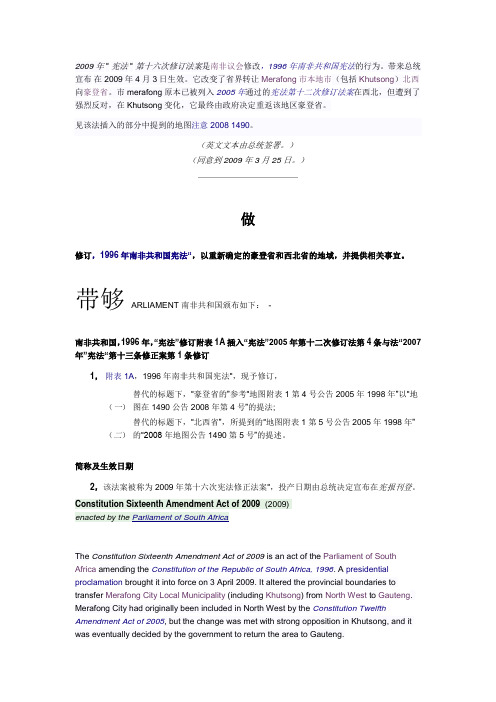
2009年“宪法“第十六次修订法案是南非议会修改,1996年南非共和国宪法的行为。
带来总统宣布在2009年4月3日生效。
它改变了省界转让Merafong市本地市(包括Khutsong)北西向豪登省。
市merafong原本已被列入2005年通过的宪法第十二次修订法案在西北,但遭到了强烈反对,在Khutsong变化,它最终由政府决定重返该地区豪登省。
见该法插入的部分中提到的地图注意2008 1490。
(英文文本由总统签署。
)(同意到2009年3月25日。
)做修订,1996年南非共和国宪法“,以重新确定的豪登省和西北省的地域,并提供相关事宜。
带够ARLIAMENT南非共和国颁布如下:-南非共和国,1996年,“宪法”修订附表1A插入“宪法”2005年第十二次修订法第4条与法“2007年”宪法“第十三条修正案第1条修订1,附表1A,1996年南非共和国宪法“,现予修订,简称及生效日期2,该法案被称为2009年第十六次宪法修正法案“,投产日期由总统决定宣布在宪报刊登。
Constitution Sixteenth Amendment Act of 2009 (2009)The Constitution Sixteenth Amendment Act of 2009 is an act of the Parliament of South Africa amending the Constitution of the Republic of South Africa, 1996. A presidential proclamation brought it into force on 3 April 2009. It altered the provincial boundaries to transfer Merafong City Local Municipality (including Khutsong) from North West to Gauteng. Merafong City had originally been included in North West by the Constitution Twelfth Amendment Act of 2005, but the change was met with strong opposition in Khutsong, and it was eventually decided by the government to return the area to Gauteng.See Notice 1490 of 2008 for the maps referred to in the sections inserted by this Act.(English text signed by the President.)(Assented to 25 March 2009.)ACTTo amend the Constitution of the Republic of South Africa, 1996, in order tore-determine the geographical areas of the provinces of Gauteng and North West; and to provide for matters connected therewith.P ARLIAMENT of the Republic of South Africa enacts as follows:—Amendment of Schedule 1A to the Constitution of the Republic of South Africa, 1996, as inserted by section 4 of the Constitution Twelfth Amendment Act of 2005 and amended by section 1 of the Constitution Thirteenth Amendment Act of 20071.Schedule 1A to the Constitution of the Republic of South Africa, 1996, is hereby amended by—Short title and commencement2. This Act is called the Constitution Sixteenth Amendment Act of 2009, and comes into operation on a date determined by the President by proclamation in the Gazette.。
关于宪法事例的素材

关于宪法事例的素材素材1:美国宪法中的第一修正案美国宪法的第一修正案规定了一系列基本权利,包括言论、出版、宗教、集会和请愿的自由。
这个修正案旨在保护公民的言论自由,确保公民可以自由地表达自己的观点,无论是政府批评还是社会争议。
这个修正案在美国的法律和司法实践中起到了非常重要的作用,为美国公民提供了广泛的自由和权利。
素材2:德国宪法中禁止种族歧视的规定德国宪法中的基本权利条款规定了禁止任何形式的种族歧视。
根据该条款,任何因种族、民族、国籍、宗教、社会背景或性别等原因而受到不平等待遇的行为都是非法的。
这一条款的目的是保护个人的尊严和平等权利,确保每个人都能够在德国社会中平等地享有权益,无论其背景如何。
素材3:南非宪法中的权利包容性南非宪法是世界上第一部明确禁止种族歧视的宪法。
根据南非宪法,每个人都有平等的权利和自由,不受种族、肤色、性别、年龄、宗教或性取向的歧视。
同时,宪法还强调了社会正义和包容的原则,要求政府采取积极措施来消除历史上的不平等,并促进不同群体之间的和解与团结。
素材4:西班牙宪法中的自治权西班牙宪法规定了各个地区的自治权。
根据该宪法,西班牙的地区拥有一定程度的政治和立法的自主权,可以制定地方性的法律和政策,管理本地的政务。
这个规定旨在平衡中央政府的权力,并满足地方社区的特殊需求和利益,保障各地区的多元性和多样性。
素材5:中国宪法中的公民权利中国宪法明确规定了公民的基本权利和自由,包括言论、新闻、宗教、人身自由、财产权和教育等方面的权利。
这些权利被视为公民的基本权益,保障公民的尊严和自由。
中国宪法还强调了公民的平等权利和法律保护,确保每个公民都能够平等地参与社会、经济和政治生活。
南非宪法法院

Main ideas:宪法法院的产生;法院体系;宪法法院的组成、任期与任命;宪法法院的性质、地位和职权;宪法法院与立法,行政机关的关系。
Referenced material:像南非这样的政治制度和法律制度都需要重建和完善的年轻国家,其重要意义是把最高权力从议会转移到宪法法院,防止少数人通过议会制定不符合宪法精神的法律,限制行政、司法权的滥用。
多年来,宪法法院在保障公民的民主、自由和人权方面,产生了很好的效果。
南非宪法和宪法法院是1994年废除种族隔离制度的产物。
1994年4月,南非颁布了历史上第一部体现种族平等的临时宪法。
1996年5月,南非制宪议会通过了在临时宪法基础上起草的新宪法。
新宪法于同年12月开始生效。
南非的司法体系基本分为法院、刑事司法和检察机关3大系统。
法院由宪法法院、最高上诉法院、高等法院、地方法院等组成。
宪法法院院长莫洪恩·莫洪恩(Mogoeng Mogoeng),最高上诉法院首席大法官莱克斯·姆帕蒂(Lex Mpati),总检察长姆索利希·恩克萨萨那(Mxolisi Nxasana)。
新宪法规定,法院系统分为宪法法院 (Constitutional Court)、最高上诉法院(Supreme Court of Appeal)、高级法院(High Courts)、地方法院(Magistrate's Courts)以及其它法院。
宪法法院由主席、常务副主席和9名法官组成,南非1996年宪法第176条规定,宪法法院法官任期12年,不得连任。
第174条规定,院长、副院长由总统与司法服务委员会及国民议会中的党派领袖磋商后任命,法官则由总统与院长及国民议会中的党派领袖磋商后任命。
宪法法院为解释宪法的最高机构,是南非的最高法院。
新宪法第167条第3项规定了宪法法院的性质和职能:宪法法院是所有宪法事务的最高法院,主要管辖一切涉及解释、保护和实施宪法的争议,可以对宪法问题以及与宪法有关的问题作出判决。
关于宪法维护公民权利的案例
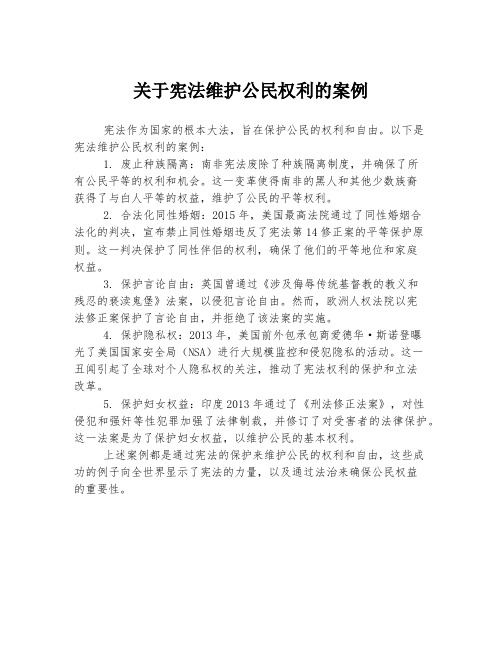
关于宪法维护公民权利的案例
宪法作为国家的根本大法,旨在保护公民的权利和自由。
以下是
宪法维护公民权利的案例:
1. 废止种族隔离:南非宪法废除了种族隔离制度,并确保了所
有公民平等的权利和机会。
这一变革使得南非的黑人和其他少数族裔
获得了与白人平等的权益,维护了公民的平等权利。
2. 合法化同性婚姻:2015年,美国最高法院通过了同性婚姻合
法化的判决,宣布禁止同性婚姻违反了宪法第14修正案的平等保护原则。
这一判决保护了同性伴侣的权利,确保了他们的平等地位和家庭
权益。
3. 保护言论自由:英国曾通过《涉及侮辱传统基督教的教义和
残忍的亵渎鬼堡》法案,以侵犯言论自由。
然而,欧洲人权法院以宪
法修正案保护了言论自由,并拒绝了该法案的实施。
4. 保护隐私权:2013年,美国前外包承包商爱德华·斯诺登曝
光了美国国家安全局(NSA)进行大规模监控和侵犯隐私的活动。
这一
丑闻引起了全球对个人隐私权的关注,推动了宪法权利的保护和立法
改革。
5. 保护妇女权益:印度2013年通过了《刑法修正法案》,对性
侵犯和强奸等性犯罪加强了法律制裁,并修订了对受害者的法律保护。
这一法案是为了保护妇女权益,以维护公民的基本权利。
上述案例都是通过宪法的保护来维护公民的权利和自由,这些成
功的例子向全世界显示了宪法的力量,以及通过法治来确保公民权益
的重要性。
历史上的今天 10月29日
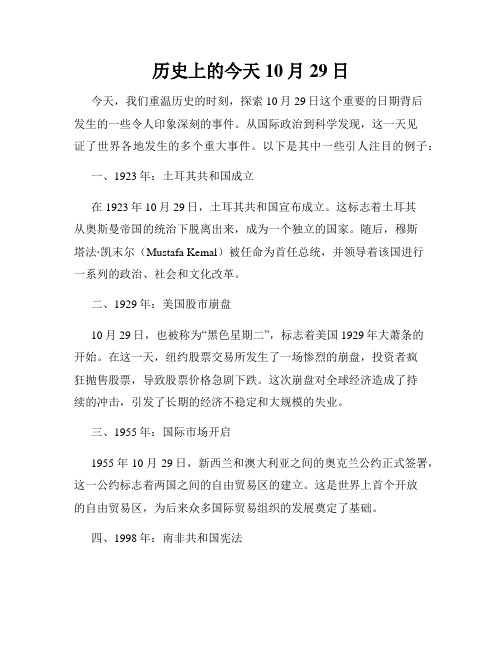
历史上的今天 10月29日今天,我们重温历史的时刻,探索10月29日这个重要的日期背后发生的一些令人印象深刻的事件。
从国际政治到科学发现,这一天见证了世界各地发生的多个重大事件。
以下是其中一些引人注目的例子:一、1923年:土耳其共和国成立在1923年10月29日,土耳其共和国宣布成立。
这标志着土耳其从奥斯曼帝国的统治下脱离出来,成为一个独立的国家。
随后,穆斯塔法·凯末尔(Mustafa Kemal)被任命为首任总统,并领导着该国进行一系列的政治、社会和文化改革。
二、1929年:美国股市崩盘10月29日,也被称为“黑色星期二”,标志着美国1929年大萧条的开始。
在这一天,纽约股票交易所发生了一场惨烈的崩盘,投资者疯狂抛售股票,导致股票价格急剧下跌。
这次崩盘对全球经济造成了持续的冲击,引发了长期的经济不稳定和大规模的失业。
三、1955年:国际市场开启1955年10月29日,新西兰和澳大利亚之间的奥克兰公约正式签署,这一公约标志着两国之间的自由贸易区的建立。
这是世界上首个开放的自由贸易区,为后来众多国际贸易组织的发展奠定了基础。
四、1998年:南非共和国宪法在1998年10月29日,南非共和国通过了一部新宪法,这一宪法标志着南非向非种族隔离制度正式告别,成为一个拥抱民主和平等的国家。
这部宪法保障了所有南非公民的基本权利和自由,被视为该国迈向和解和团结的重大里程碑。
五、2012年:NASA的“好奇号”登陆火星在2012年10月29日,美国航空航天局(NASA)的“好奇号”火星车成功降落在火星上,这是宇航员人类历史上第一次探测上火星器。
该任务的目标是研究火星的地质构造和可居住性,为人类在未来探索和定居其他星球提供重要的信息。
这仅仅是历史上今天发生的一些重要事件的一小部分。
每个事件都在某种程度上影响了人类的发展和演变。
回顾历史,我们可以从过去汲取经验教训,并为未来的发展做好准备。
让我们记住这些重要的历史事件,以珍惜和尊重我们的过去,并通过这些故事和经验,将历史的教训应用于当下和未来的生活中。
南非政治

南非政治政体1993年11月18日,南非多党谈判通过临时宪法草案,于1994年4月27日正式生效。
这是南非历史上第一部体现种族平等的宪法。
1996年5月8日,制宪议会通过新宪法草案,草案经修改后于10月7日正式通过,并于12月4日经宪法法院批准。
12月10日,曼德拉总统签署政令批准新宪法,新宪法于1997年开始分阶段实施。
新宪法保留了临时宪法中权利法案、三权分立系统、联邦制政府管理体制和现行司法体系的重大制宪原则和内容。
对临时宪法的主要修改是,1999年大选后,将各政党按比例分享权力改为大选中的多数党单独执政。
新宪法规定,不分种族、性别、宗教,法律面前人人平等。
司法机构由宪法法院、最高法院、高级法院、地方法院及国家检察总局和各级检察机关组成。
宪法法院为解释宪法的最高司法机构;最高法院为除宪法事务外的最高司法机构;国家检察总局向司法部长负责,检察机关对应每个高等法院设置;各级检察机关向各级法院提起公诉。
立法机构由国民议会和地方议院组成。
议会分为国民议会和省级事务全国委员会,国民议会共设400个议席,200个席位通过全国大选产生,另200个席位由省级选举产生。
政府分为中央、省和地方三级,任期5年,实行总统内阁制,总统由选民选举产生,内阁首相兼任副总统,由总统任命国民议会多数党领袖产生,对总统负责,其他不超过27名部长亦由总统任命。
总统任期不得超过两任。
以非国大为主体的民族团结政府奉行和解、稳定、发展的政策,妥善处理种族矛盾,全面推行社会变革,实施“重建与发展计划”、“提高黑人经济实力”战略和“肯定****”,努力提高黑人政治、经济和社会地位,实现由白人政权向多种族联合政权的平稳过渡。
1996年,国民党退出民族团结政府,非国大领导的三方联盟基本实现单独执政。
非国大继续奉行种族和解政策,努力保持社会稳定,不断提高黑人社会地位和生活水平,连续赢得1999年和2004年大选。
2007年,非国大提出建设“发展型国家”的理念,强调加快经济发展,妥善解决贫困、犯罪等社会问题。
南非政治和经济

1994年4月,南非颁布了历史上第一部体现种族平等的临时宪法。
1996年5月,南非制宪议会通过了在临时宪法基础上起草的新宪法。
新宪法于同年12月开始生效。
新宪法规定,宪法具有至高无上的地位;不分种族、性别、宗教,法律面前人人平等;保留临时宪法中的权利法案、三权分立系统、联邦制政府管理体制和现行司法体系的重大制宪原则和内容;1999年大选后,南非将各政党按比例分享权力改为由大选中的多数党执政。
根据新宪法,南非总统是国家元首和政府首脑,由国民议会选举产生,任期不得超过两任。
在议会中拥有至少80席的政党有权提名一名副总统。
议会可以通过不信任案罢免或弹劾总统。
宪法规定,南非议会为两院制,由国民议会和全国省级事务委员会组成。
国民议会有400名议员,200名通过大选产生,另200名由各省选举产生。
全国省级事务委员会(前身为参议院)共设90个议席,由9个省议会间接选举产生,每省10个议席。
新宪法规定实行总统内阁制。
内阁由总统、副总统及总统任命的27名部长组成。
总统和内阁成员共同行使行政权。
新宪法还规定,法院由宪法法院、最高法院、高级法院、地方法院组成。
宪法法院为解释宪法的最高机构,由主席、常务副主席和9名法官组成,有权撤消国会通过建立的立法机关。
最高法院为除宪法事务外的最高司法机构,由首席法官、上诉庭法官和省庭法官组成。
地方法院上诉的案件提交最高法院的省庭裁决,省庭上诉则提交最高法院的上诉庭裁决。
南非属于中等收入的发展中国家。
是非洲大陆经济最为发达的国家,有“非洲经济巨人”之称生产总值占全非大陆30%多,但是经济结构脆弱,经济建设资金严重依赖出口收入和外国资本。
近两年来,在政府积极经济政策推动下,南经济形势不断转好,经济增长步伐加快,2005年南经济增长率达到4.9%。
南非基础设施良好,资源丰富,经济开发程度高。
矿业.制造业和农业是经济三大支柱,国民经济各部门发展水平.地区分布不平衡,收入分配不均。
制造业是南非国民经济最重要的支柱产业,主要工业部门包括钢铁.有色冶金.化工.机械制造电子.冶金和机械是南非制造业中最大的生产部门,超值为整个制造业的1/3。
南非共和国宪法

②倘获得最少数票之候选人有二人式二人以上,,则选举团应另行投票,其次数视实际需要,以决定此二人或不止二人何人应依照①款之规定先行除名。
③授予荣典;
④任命、派遣、接见与承认大使、专使、外交代表及其他外交官员、领事、馆员;
⑤遵照本宪法之规定,决定国会会期及休会;
⑥凭己意无条件或有条件赦免或缓刑,或取消任何罚款或没收处分;
⑦国际会议、条约、协定之加入与批准;
⑧宣布或停止戒严;
⑨宣战与媾和;
①凡曾任总统职务者,每年应得退休金六千非币。
②总统遗孀,除卸任以后结婚者外,每年应得总统退休金2/3之养老金。
(2)上述第一项退休金应于:
总统卸任之次日开始支付。
②倘为遗孀,则于成为遗孀之日开支付。
(3)1909年南非法第十条虽经第一百二十条所废止,该后段规定应付者仍应继续支付。
②除非先有众议院议员三十人以上之联名请求书送达参众院议长处,请求指派两院联合小组委员会调查总统,则众议院不得有决议组织小组委员会之举。
③关于③款所云决议,参众两院均不得作辨论。
(3)总统得以书面辞职书提交众议院议长,再由议长通知总理,即为辞职。
(4)总统非先经政务委员会同意,不得离开共和国。
天其佑之。”
(6)1909年南非法第十四条所规定且为本宪法未生效前所成立之各部,应视同本宪法本条所规定正式成立者;又同法第一项规定任命之部长,在本宪法未生效前主持部务者,应视同遵照本宪法规定而正式任命者,然仍须遵照第五项规定先行宣誓,再继续任职。
南非人权日纪念南非宪法的重要日子

南非人权日纪念南非宪法的重要日子南非人权日是每年3月21日,在南非被广泛地视为重要的纪念日之一。
这一天旨在庆祝南非宪法的制定,并且纪念南非人民在争取平等权利和结束种族隔离政策的斗争中所取得的重大胜利。
南非的宪法被认为是世界上最进步的宪法之一,其宗旨是确保各个公民在法律面前都享有平等权利和自由。
南非人权日的起源可以追溯到1960年3月21日,也称为夏普维尔大屠杀纪念日。
当时,政府强制实行种族隔离政策,并且禁止非洲人举行和平示威活动。
在夏普维尔镇,数千名和平示威者走上街头,抗议政府的不公正政策。
然而,政府军队却使用武力对待和平示威者,导致69人丧生,其中大部分是非洲人。
夏普维尔大屠杀成为了推动南非民主变革的转折点,也使得民主力量的声音再次被世界听见。
这次悲剧促使了南非人民的团结,他们开始为争取平等和结束种族隔离政策而奋斗。
在经过长期的斗争和谈判后,南非终于于1994年实现了全面民主,尼尔森·曼德拉当选为南非第一位黑人总统。
1996年,南非宪法得以制定并正式生效,成为南非新时代民主制度的法律基础。
南非宪法赋予了每个人平等权利和自由,无论他们的种族、宗教、性别还是性取向。
宪法还规定了国家的基本原则和价值观,包括民主、多元文化和社会公正。
南非宪法为南非人民树立了新的希望和方向。
它鼓励着南非人民积极投身社会事务,并为他们提供了保护和促进其权益的法律保障。
宪法还确保了公共服务的普及,包括教育、医疗和住房等基本权益。
南非人权日的纪念活动包括各种庆祝仪式和文化表演。
人们会聚集在一起,共同回顾南非民主历程中的重要时刻,并纪念那些为南非自由与平等做出巨大贡献的人们。
这一天也是南非人民反思过去、珍视现在和展望未来的时刻。
南非人权日的意义远不止于南非本土。
它提醒我们,在全球范围内坚守着人权价值和原则的重要性。
尽管在许多地方仍然存在着偏见、不平等和违反人权的情况,但南非人权日鼓励我们团结起来,为实现一个更加公正和包容的世界而努力奋斗。
南非共和国宪法(1996)

South Africa - Constitution(1996)South Africa - ConstitutionPREAMBLE We, the people of South Africa,Recognise the injustices of our past;Honour those who suffered for justice and freedom in our land;Respect those who have worked to build and develop our country; andBelieve that South Africa belongs to all who live in it, united in our diversity.We therefore, through our freely elected representatives, adopt this Constitution as the supreme law of the Republic so as to -Heal the divisions of the past and establish a society based on democratic values, social justice and fundamental human rights;Lay the foundations for a democratic and open society in which government is based on the will of the people and every citizen is equally protected by law;Improve the quality of life of all citizens and free the potential of each person;Build a united and democratic South Africa able to take its rightful place as a sovereign state in the family of nations.May God protect our people.Nkosi Sikelel' iAfrika. Morena boloka setjhaba sa heso.God seën Suid-Afrika. God bless South Africa.Mudzimu fhatutshedza Afurika. Hosi katekisa Afrika.Chapter 1 Founding ProvisionsSection 1 Republic of South AfricaThe Republic of South Africa is one sovereign democratic state founded on the following values:(a) Human dignity, the achievement of equality and advancement of human rights and freedoms.(b) Non-racialism and non-sexism.(c) Supremacy of the constitution and the rule of law.(d) Universal adult suffrage, a national common voters roll, regular elections, and a multi-party system of democratic government, to ensure accountability, responsiveness and openness. Section 2 Supremacy of ConstitutionThis Constitution is the supreme law of the Republic; law or conduct inconsistent with it is invalid, and the duties imposed by it must be performed.Section 3 Citizenship(1) There is a common South African citizenship.(2) All citizens are -(a) equally entitled to the rights, privileges and benefits of citizenship; and(b) equally subject to the duties and responsibilities of citizenship.(3) National legislation must provide for the acquisition, loss and restoration of citizenship. Section 4 National anthemThe national anthem of the Republic is determined by the President by proclamation.Section 5 National flagThe national flag of the Republic is black, gold, green, white, red and blue, as described and sketched in Schedule 1.Section 6 Languages(1) The official languages of the Republic are Sepedi, Sesotho, Setswana, siSwati, Tshivenda, Xitsonga, Afrikaans, English, isiNdebele, isiXhosa and isiZulu.(2) Recognising the historically diminished use and status of the indigenous languages of our people, the state must take practical and positive measures to elevate the status and advance the use of these languages.(3) National and provincial governments may use particular official languages for the purposes of government, taking into account usage, practicality, expense, regional circumstances, and the balance of the needs and preferences of the population as a whole or in respective provinces; provided that no national or provincial government may use only one official language. Municipalities must take into consideration the language usage and preferences of their residents.(4) National and provincial governments, by legislative and other measures, must regulate and monitor the use by those governments of official languages. Without detracting from the provisions of subsection (2), all official languages must enjoy parity of esteem and must be treated equitably.(5) The Pan South African Language Board must -(a) promote and create conditions for the development and use of(i) all official languages;(ii) the Khoi, Nama and San languages; and(iii) sign language.(b) promote and ensure respect for languages, including German, Greek, Gujarati, Hindi, Portuguese, Tamil, Telugu, Urdu, and others commonly used by communities in South Africa, and Arabic, Hebrew, Sanskrit and others used for religious purposes.Chapter 2 Bill of RightsSection 7 Rights(1) This Bill of Rights is a cornerstone of democracy in South Africa. It enshrines the rights of all people in our country and affirms the democratic values of human dignity, equality and freedom.(2) The state must respect, protect, promote, and fulfil the rights in the Bill of Rights.(3) The rights in the Bill of Rights are subject to the limitations contained or referred to in section 36, or elsewhere in the Bill.Section 8 Application(1) The Bill of Rights applies to all law and binds the legislature, the executive, the judiciary, and all organs of state.(2) A provision of the Bill of Rights binds natural and juristic persons if, and to the extent that, it is applicable, taking into account the nature of the right and of any duty imposed by the right.(3) In applying the provisions of the Bill of Rights to natural and juristic persons in terms ofsubsection (2), a court -(a) in order to give effect to a right in the Bill, must apply, or where necessary, develop, the common law to the extent that legislation does not give effect to that right; and(b) may develop rules of the common law to limit the right, provided that the limitation is in accordance with section 36(1).(4) Juristic persons are entitled to the rights in the Bill of Rights to the extent required by the nature of the rights and of the juristic persons.Section 9 Equality(1) Everyone is equal before the law and has the right to equal protection and benefit of the law.(2) Equality includes the full and equal enjoyment of all rights and freedoms. To promote the achievement of equality, legislative and other measures designed to protect or advance persons, or categories of persons, disadvantaged by unfair discrimination may be taken. (3) The state may not unfairly discriminate directly or indirectly against anyone on one or more grounds, including race, gender, sex, pregnancy, marital status, ethnic or social origin, colour, sexual orientation, age, disability, religion, conscience, belief, culture, language, and birth. (4) No person may unfairly discriminate directly or indirectly against anyone on one or more grounds in terms of subsection (3). National legislation must be enacted to prevent or prohibit unfair discrimination.(5) Discrimination on one or more of the grounds listed in subsection (3) is unfair unless it is established that the discrimination is fair.Section 10 Human dignityEveryone has inherent dignity and the right to have their dignity respected and protected. Section 11 LifeEveryone has the right to life.Section 12 Freedom and security of the person(1) Everyone has the right to freedom and security of the person, which includes the right -(a) not to be deprived of freedom arbitrarily or without just cause;(b) not to be detained without trial;(c) to be free from all forms of violence from both public and private sources;(d) not to be tortured in any way; and(e) not to be treated or punished in a cruel, inhuman or degrading way.(2) Everyone has the right to bodily and psychological integrity, which includes the right -(a) to make decisions concerning reproduction;(b) to security in and control over their body; and(c) not to be subjected to medical or scientific experiments without their informed consent. Section 13 Slavery, servitude and forced labourNo one may be subjected to slavery, servitude or forced labour.Section 14 PrivacyEveryone has the right to privacy, which includes the right not to have -(a) their person or home searched;(b) their property searched;(c) their possessions seized; or(d) the privacy of their communications infringed.Section 15 Freedom of religion, belief and opinion(1) Everyone has the right to freedom of conscience, religion, thought, belief and opinion.(2) Religious observances may be conducted at state or state-aided institutions provided that -(a) those observances follow rules made by the appropriate public authorities;(b) they are conducted on an equitable basis; and(c) attendance at them is free and voluntary.(3) (a) This section does not prevent legislation recognising -(i) marriages concluded under any tradition or a system of religious, personal or family law; or (ii) systems of personal and family law under any tradition or adhered to by persons professinga particular religion.(b) Recognition in terms of paragraph (a) must be consistentwith this section and the other provisions of the Constitution.Section 16 Freedom of expression(1) Everyone has the right to freedom of expression, which includes -(a) freedom of the press and other media;(b) freedom to receive and impart information and ideas;(c) freedom of artistic creativity; and(d) academic freedom and freedom of scientific research.(2) The right in subsection (1) does not extend to -(a) propaganda for war;(b) incitement of imminent violence; or(c) advocacy of hatred that is based on race, ethnicity, gender or religion, and that constitutes incitement to cause harm.Section 17 Assembly, demonstration, picket and petitionEveryone has the right, peacefully and unarmed, to assemble, to demonstrate, to picket, and to present petitions.Section 18 Freedom of associationEveryone has the right to freedom of association.Section 19 Political rights(1) Every citizen is free to make political choices, which includes the right-(a) to form a political party;(b) to participate in the activities of, or recruit members for, a political party; and(c) to campaign for a political party or cause.(2) Every citizen has the right to free, fair and regular elections for any legislative body established in terms of the Constitution.(3) Every adult citizen has the right -(a) to vote in elections for any legislative body established in terms of the Constitution, and to do so in secret; and(b) to stand for public office and, if elected, to hold office.Section 20 CitizenshipNo citizen may be deprived of citizenship.Section 21 Freedom of movement and residence(1) Everyone has the right to freedom of movement.(2) Everyone has the right to leave the Republic.(3) Every citizen has the right to enter, to remain in, and to reside anywhere in, the Republic.(4) Every citizen has the right to a passport.Section 22 Freedom of trade, occupation and professionEvery citizen has the right to choose their trade, occupation or profession freely. The practice of a trade, occupation or profession may be regulated by law.Section 23 Labour relations(1) Everyone has the right to fair labour practices.(2) Every worker has the right -(a) to form and join a trade union;(b) to participate in the activities and programmes of a trade union; and(c) to strike.(3) Every employer has the right -(a) to form and join an employers' organisation; and(b) to participate in the activities and programmes of an employers' organisation.(4) Every trade union and every employers' organisation has the right -(a) to determine its own administration, programmes and activities;(b) to organise;(c) to bargain collectively; and(d) to form and join a federation.(5) The provisions of the Bill of Rights do not prevent legislation recognising union security arrangements contained in collective agreements.Section 24 EnvironmentEveryone has the right -(a) to an environment that is not harmful to their health or well-being; and(b) to have the environment protected, for the benefit of present and future generations, through reasonable legislative and other measures that -(i) prevent pollution and ecological degradation;(ii) promote conservation; and(iii) secure ecologically sustainable development and use of natural resources while promoting justifiable economic and social development.Section 25 Property(1) No one may be deprived of property except in terms of law of general application, and no law may permit arbitrary deprivation of property.(2) Property may be expropriated only in terms of law of general application -(a) for public purposes or in the public interest; and(b) subject to compensation, the amount, timing, and manner ofpayment, of which must be agreed, or decided or approved by a court.(3) The amount, timing, and manner of payment, of compensation must be just and equitable, reflecting an equitable balance between the public interest and the interests of those affected, having regard to all relevant factors, including -(a) the current use of the property;(b) the history of the acquisition and use of the property;(c) the market value of the property;(d) the extent of direct state investment and subsidy in the acquisition and beneficial capital improvement of the property; and(e) the purpose of the expropriation.(4) For the purposes of this section -(a) the public interest includes the nation's commitment to land reform, and to reforms to bring about equitable access to all South Africa's natural resources; and(b) property is not limited to land.(5) The state must take reasonable legislative and other measures, within its available resources, to foster conditions which enable citizens to gain access to land on an equitable basis.(6) A person or community whose tenure of land is legally insecure as a result of past racially discriminatory laws or practices is entitled, to the extent provided by an Act of Parliament, either to tenure which is legally secure, or to comparable redress.(7) A person or community dispossessed of property after 19 June 1913 as a result of past racially discriminatory laws or practices is entitled, to the extent provided by an Act of Parliament, either to restitution of that property, or to equitable redress.(8) No provision of this section may impede the state from taking legislative and other measures to achieve land, water and related reform, in order to redress the results of past racial discrimination, provided that any departure from the provisions of this section is in accordance with the provisions of section 36(1).(9) Parliament must enact the legislation referred to in subsections (6).Section 26 Housing(1) Everyone has the right to have access to adequate housing.(2) The state must take reasonable legislative and other measures, within its available resources, to achieve the progressive realisation of this right.(3) No one may be evicted from their home, or have their home demolished, without an order of court made after considering all the relevant circumstances. No legislation may permit arbitrary evictions.Section 27 Health care, food, water, and social security(1) Everyone has the right to have access to -(a) health care services, including reproductive health care;(b) sufficient food and water; and(c) social security, including, if they are unable to support themselves and their dependants, appropriate social assistance.(2) The state must take reasonable legislative and other measures, within its available resources, to achieve the progressive realisation of each of these rights.(3) No one may be refused emergency medical treatment.Section 28 Children(1) Every child has the right -(a) to a name and a nationality from birth;(b) to family care, parental care, or appropriate alternative care when removed from the family environment;(c) to basic nutrition, shelter, basic health care services, and social services;(d) to be protected from maltreatment, neglect, abuse, or degradation;(e) to be protected from exploitative labour practices;(f) not to be required or permitted to perform work or provide services that -(i) are inappropriate for a person of that child's age; or(ii) place at risk the child's well-being, education, physical or mental health, or spiritual, moral, or social development;(g) not to be detained except as a measure of last resort, in which case, in addition to the rights a child enjoys under sections 12 and 35, the child may be detained only for the shortest appropriate period of time, and has the right to be -(i) kept separately from detained persons over the age of 18 years; and(ii) treated in a manner, and kept in conditions, that take account of the child's age;(h) to have a legal practitioner assigned to the child by the state, and at state expense, in civil proceedings affecting the child, if substantial injustice would otherwise result; and(i) not to be used directly in armed conflict, and to be protected in times of armed conflict.(2) A child's best interest is of paramount importance in every matter concerning the child.(3) In this section, "child" means a person under the age of 18 years.Section 29 Education(1) Everyone has the right -(a) to a basic education, including adult basic education; and(b) to further education, which the state must take reasonable measures to make progressively available and accessible.(2) Everyone has the right to receive education in the official language or languages of their choice in public educational institutions where that education is reasonably practicable. In order to ensure the effective access to, and implementation of, this right, the state must consider all reasonable educational alternatives, including single medium institutions, taking into account -(a) equity;(b) practicability; and(c) the need to redress the results of past racially discriminatory law and practice.(3) Everyone has the right to establish and maintain, at their own expense, independent educational institutions that -(a) do not discriminate on the basis of race;(b) are registered with the state; and(c) maintain standards that are not inferior to standards at comparable public educational institutions.(4) Subsection (3) does not preclude state subsidies for independent educational institutions. Section 30 Language and cultureEveryone has the right to use the language and to participate in the cultural life of their choice, but no one exercising these rights may do so in a manner inconsistent with any provision of the Bill of Rights.Section 31 Cultural, religious and linguistic communities(1) Persons belonging to a cultural, religious or linguistic community may not be denied the right, with other members of their community, to -(a) enjoy their culture, practise their religion and use their language; and(b) form, join and maintain cultural, religious and linguistic associations and other organs of civil society.(2) This right may not be exercised in a manner inconsistent with any provision of the Bill of Rights.Section 32 Access to information(1) Everyone has the right of access to -(a) any information held by the state; and(b) any information that is held by another person and that is required for the exercise or protection of any rights.(2) National legislation must be enacted to give effect to this right, and may provide for reasonable measures to alleviate the administrative and financial burden on the state. Section 33 Just administrative action(1) Everyone has the right to administrative action that is lawful, reasonable and procedurally fair.(2) Everyone whose rights have been adversely affected by administrative action has the right to be given written reasons.(3) National legislation must be enacted to give effect to these rights, and must -(a) provide for the review of administrative action by a court or, where appropriate, an independent and impartial tribunal;(b) impose a duty on the state to give effect to the rights in subsections (1) and (2); and(c) promote an efficient administration.Section 34 Access to courtsEveryone has the right to have any dispute that can be resolved by the application of law decided in a fair public hearing in a court or, where appropriate, another independent and impartial forum.Section 35 Arrested, detained and accused persons(1) Everyone who is arrested for allegedly committing an offence has the right-(a) to remain silent;(b) to be informed promptly -(i) of the right to remain silent; and(ii) of the consequences of not remaining silent;(c) not to be compelled to make any confession or admission that could be used in evidence against that person;(d) to be brought before a court as soon as reasonably possible, but not later than 48 hours after the arrest, but if that period expires outside ordinary court hours, to be brought before a court on the first court day after the end of that period;(e) at the first court appearance after being arrested, to be charged or to be informed of the reason for the detention to continue, or to be released; and(f) to be released from detention if the interests of justice permit, subject to reasonable conditions.(2) Everyone who is detained, including every sentenced prisoner, has the right-(a) to be informed promptly of the reason for being detained;(b) to choose, and to consult with, a legal practitioner, and to be informed of this right promptly;(c) to have a legal practitioner assigned to the detained person by the state, and at state expense, if substantial injustice would otherwise result, and to be informed of this right promptly;(d) to challenge the lawfulness of the detention in person before a court and, if the detention is unlawful, to be released;(e) to conditions of detention that are consistent with human dignity, including at least exercise and the provision, at state expense, of adequate accommodation, nutrition, reading material, and medical treatment; and(f) to communicate with, and be visited by, that person's -(i) spouse or partner;(ii) next of kin;(iii) chosen religious counsellor; and(iv) chosen medical practitioner.(3) Every accused has a right to a fair trial, which includes theright -(a) to be informed of the charge with sufficient details to answer it;(b) to have adequate time and facilities to prepare a defence;(c) to a public trial in an ordinary court;(d) to have their trial begin and conclude without unreasonable delay;(e) to be present when being tried;(f) to choose, and be represented by, a legal practitioner, and to be informed of this right;(g) to have a legal practitioner assigned to the accused by the state, and at state expense, if substantial injustice would otherwise result, and to be informed of this right;(h) to be presumed innocent, to remain silent, and not to testify during the proceedings;(i) to adduce and challenge evidence;(j) not to be compelled to give self-incriminating evidence;(k) to be tried in a language that the accused person understands or, if that is not practicable, to have the proceedings interpreted in that language;(l) not to be convicted for an act or omission that was not an offence under either national or international law at the time it was committed or omitted;(m) not to be tried for an offence in respect of an act or omission for which that person has previously been either acquitted or convicted;(n) to the benefit of the least severe of the prescribed punishments if the prescribed punishment for the offence has been changed between the time that the offence was committed and the time of sentencing; and(o) of appeal to, or review by, a higher court.(4) Whenever this section requires information to be given to a person, that information must be given in a language that the person understands.(5) Evidence obtained in a manner that violates any right in the Bill of Rights must be excluded if the admission of that evidence would render the trial unfair or otherwise be detrimental to the administration of justice.Section 36 Limitation of rights(1) The rights in the Bill of Rights may be limited only in terms of law of general application to the extent that the limitation is reasonable and justifiable in an open and democratic society based on human dignity, equality and freedom, taking into account all relevant factors including-(a) the nature of the right;(b) the importance of the purpose of the limitation;(c) the nature and extent of the limitation;(d) the relation between the limitation and its purpose; and(e) less restrictive means to achieve the purpose.(2) Except as provided in subsection (1) or in any otherprovision of the Constitution, no law may limit any right entrenched in the Bill of Rights. Section 37 States of emergency(1) A state of emergency may be declared only in terms of an Act of Parliament and only when -(a) the life of the nation is threatened by war, invasion, general insurrection, disorder, natural disaster, or other public emergency; and(b) the declaration is necessary to restore peace and order.(2) A declaration of a state of emergency, and any legislation enacted or other action taken in consequence of that declaration, may be effective only -(a) prospectively from the date of the declaration; and(b) for no more than 21 days from the date of the declaration, unless the National Assembly resolves to extend the declaration. The National Assembly may extend a declaration of a state of emergency for no more than three months at a time. The first extension of the state of emergency must be by a resolution supported by a majority of the members of the National Assembly. Any subsequent extension must be by a resolution supported by at least 60 per cent of the members of the Assembly. A resolution in terms of this paragraph may be adopted only following a public debate in the Assembly.(3) Any competent court may decide on the validity of -(a) a declaration of a state of emergency;(b) any extension of a declaration of a state of emergency; or(c) any legislation enacted, or other action taken, in consequence of a declaration of a state of emergency.(4) Any legislation enacted in consequence of a declared state of emergency may derogate from the Bill of Rights only to the extent that -(a) the derogation is strictly required by the emergency; and(b) the legislation -(i) is consistent with the Republic's obligations under international law applicable to states of emergency;(ii) conforms to subsection (5); and(iii) is published in the national Government Gazette as soon as reasonably possible after being enacted.(5) No Act of Parliament that authorises a declaration of a state of emergency, and no legislation enacted or other action taken in consequence of a declaration, may permit or authorise -(a) indemnifying the state, or any person, in respect of any unlawful act;(b) any derogation from this section; or(c) any derogation from a section mentioned in column 1 of the Table of Non- Derogable Rights, to the extent indicated opposite that section in column 3 of that table.(6) Whenever anyone is detained without trial in consequence of a derogation of rights resulting from a declaration of a state of emergency, the following conditions must be observed: (a) An adult family member or friend of the detainee must be contacted as soon as reasonably possible, and told that the person has been detained.(b) A notice must be published in the national Government Gazette within five days of the person being detained, stating the detainee's name and place of detention and referring to the emergency measure in terms of which that person has been detained.(c) The detainee must be allowed to choose, and be visited at any reasonable time by, a medical practitioner.(d) The detainee must be allowed to choose, and be visited at any reasonable time by, a legal representative.(e) A court must review the detention as soon as reasonably possible, but no later than 10 days after the date the person was detained, and the court must release the detainee unless it is necessary to continue the detention to restore peace and order.(f) A detainee who is not released in terms of paragraph (e), or who is not released in terms of a review under this paragraph, may apply to a court for a further review of the detention any time more than 10 days after the previous review, and in either case, the court must release the detainee unless it is necessary to continue the detention to restore peace and order.(g) The detainee must be allowed to appear in person before any court considering the detention, to be represented by a legal practitioner at those hearings, and to make representations against continued detention.(h) The state must present written reasons to the court to justify the continued detention of the detainee, and must give a copy of those reasons to the detainee at least two days before the court reviews the detention.(7) If a court releases a detainee, that person may not be detained again on the same grounds unless the state first shows a court good cause for re-detaining that person.(8) Subsections (6) and (7) do not apply to persons who are not citizens of the Republic and who are detained in consequence of an international armed conflict. Instead, the state must comply with the standards binding on the Republic under international humanitarian law in respect of the detention of those persons.Section 38 Enforcement of rightsAnyone listed in this section has the right to approach a competent court, alleging that a right in the Bill of Rights has been infringed or threatened, and the court may grant appropriate relief, including a declaration of rights. The persons who may approach a court are -(a) anyone acting in their own interest;(b) anyone acting on behalf of another person who cannot act in their own name;(c) anyone acting as a member of, or in the interest of, a group or a class of persons;(d) anyone acting in the public interest; and(e) an association acting in the interest of its members.Section 39 Interpretation of Bill of Rights(1) When interpreting the Bill of Rights, a court, tribunal or forum -(a) must promote the values that underlie an open and democratic society based on human dignity, equality and freedom;(b) must consider international law; and(c) may consider foreign law.(2) When interpreting any legislation, and when developing the common law or customary law, every court, tribunal or forum must promote the spirit, purport, and objects of the Bill of Rights.。
新加坡,南非,欧盟宪政
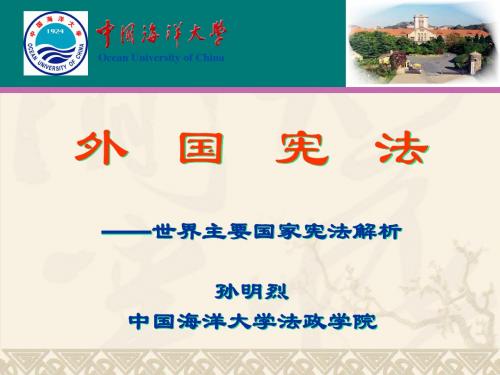
高效, 1991年修改宪法,总统被授予部分 消极性权力,大于传统的议会内阁制元首 的权力。 宪法规定总统由选民直接选举,候选人需 年满45周岁,在新加坡居住10年以上,德 才兼备。
第三节 总统
总统主要职权
决定是否批准总理及其政府在国家储备和资产
方面的开支 决定是否批准公共服务的重要职位的任命,包 括最高法院法官、总检察长、总审计长等
人口约332万,其中华人占约77%,地处马六 甲海峡,是连接太平洋与印度洋的交通枢纽。 新加坡是一个以华人为主的社会,中国传统文 化在新加坡有重要影响;新加坡长期属于英国 殖民地,英国的法律传统对新加坡影响很深。
第一节 宪法的历史发展
历史背景
新加坡实行英国式的议会内阁制,但并没有完
全照搬西方式的民主,而是以生存和经济发展 为首要任务,把中华传统文化融入国家发展。 新加坡经济迅速发展,政治民主也很有特色, 证明华人同样可以建设民主和经济皆发达的社 会。
曼德拉
纳尔逊·曼德拉,1918年生于南非特兰斯凯一个大酋长家庭,因是长 子被指定为酋长继承人。但他表示:“决不愿以酋长身份统治一个受 压迫的部族”,而要 “以一个战士的名义投身于民族解放事业”。 他毅然放弃酋长之位,投身黑人解放运动。 曼德拉1944年参加非洲人国民大会(“非国大”),1961年组织非国 大军事组织“民族之矛”,并任总司令。1962年被捕入狱,在狱中度 过27个春秋。他备受迫害和折磨,但始终坚贞不屈。 1990年南非当局被迫释放曼德拉。曼德拉于1991年当选为非国大主席, 1994年成为南非第一任黑人总统,1997年主动辞去非国大主席职务, 1999年主动不再谋求连任。 曼德拉有着坚忍的毅力,博大的胸怀,崇高的品质,高尚的政治家风 范,是20世纪最伟大的人物之一,深受南非和全世界人民爱戴。
南非涉外案件法律适用(3篇)
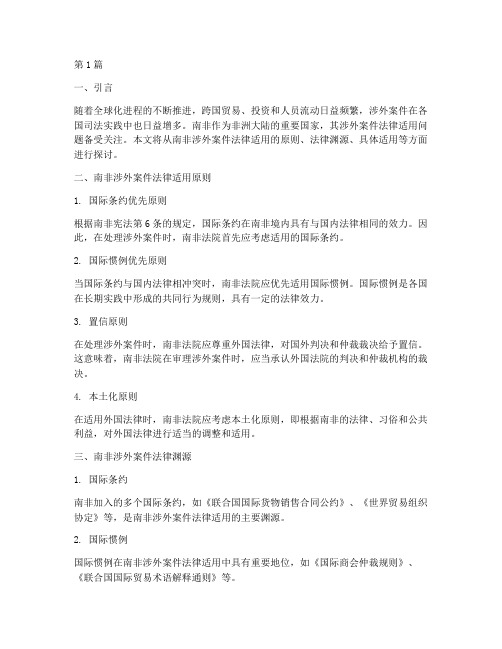
第1篇一、引言随着全球化进程的不断推进,跨国贸易、投资和人员流动日益频繁,涉外案件在各国司法实践中也日益增多。
南非作为非洲大陆的重要国家,其涉外案件法律适用问题备受关注。
本文将从南非涉外案件法律适用的原则、法律渊源、具体适用等方面进行探讨。
二、南非涉外案件法律适用原则1. 国际条约优先原则根据南非宪法第6条的规定,国际条约在南非境内具有与国内法律相同的效力。
因此,在处理涉外案件时,南非法院首先应考虑适用的国际条约。
2. 国际惯例优先原则当国际条约与国内法律相冲突时,南非法院应优先适用国际惯例。
国际惯例是各国在长期实践中形成的共同行为规则,具有一定的法律效力。
3. 置信原则在处理涉外案件时,南非法院应尊重外国法律,对国外判决和仲裁裁决给予置信。
这意味着,南非法院在审理涉外案件时,应当承认外国法院的判决和仲裁机构的裁决。
4. 本土化原则在适用外国法律时,南非法院应考虑本土化原则,即根据南非的法律、习俗和公共利益,对外国法律进行适当的调整和适用。
三、南非涉外案件法律渊源1. 国际条约南非加入的多个国际条约,如《联合国国际货物销售合同公约》、《世界贸易组织协定》等,是南非涉外案件法律适用的主要渊源。
2. 国际惯例国际惯例在南非涉外案件法律适用中具有重要地位,如《国际商会仲裁规则》、《联合国国际贸易术语解释通则》等。
3. 国内法律南非国内法律在涉外案件法律适用中具有一定的作用,如《南非民法典》、《商业公司法》等。
4. 地方性法规和条例南非各省份的地方性法规和条例,在处理涉外案件时,也可能成为适用的法律渊源。
四、南非涉外案件法律适用具体分析1. 合同纠纷在合同纠纷案件中,南非法院通常会优先考虑适用的国际条约,如《联合国国际货物销售合同公约》。
当国际条约与国内法律相冲突时,法院会根据置信原则,优先适用国际条约。
2. 知识产权纠纷在知识产权纠纷案件中,南非法院会考虑适用的国际条约,如《伯尔尼公约》、《世界知识产权组织版权条约》等。
南非和中国的民主制度有何差异?

南非和中国的民主制度有何差异?南非和中国作为两个具有代表性的新兴国家,他们的民主制度有何不同呢?针对这个问题,本文将从以下几个方面进行分析。
一、宪法制度的差异南非宪法是南非实现多民族、多元化社会的基础性文件,其通过制定严格的宪法法规来保障公民权利和民主法治,保障了各族群体对权力的制约作用。
相比之下,中国宪法制度虽然结构相对严密,但受到一些行政干预,限制了公民权益的发展。
南非宪法强调了赋权解决问题原则,诸如在女性和少数民族方面的社会参与权、归还土地等方面进行了法律保障,而中国则强调了党委对权力的掌控,强制性发展相关法律法规并每层级主管垂直负责和外部民间监管相结合,这两种宪法制度的存在差异明显。
二、政党制度的差异南非的政党制度是多元化的,以代表各种群体的多个政党的竞争为特色。
政治党派有权参与议会选举,并竞选议会席位。
在选举期间,各政党可以进行大量的活动和竞选,竞选的同时可以公开发表不同的政见,形成政见的较量。
同时,政党作为媒介,传递各自观点,促进民主化进程。
中国政党制度强调党的领导地位,共产党掌握着国家、地方和社会组织的大权,其为中国完善了政治体制,但存在不平等、民主、自由的问题。
三、选举制度的差异南非的选举制度比中国复杂得多,印度支那、穆斯林、领土行政单位等地,往往有不同的投票方式,投票人群有不同的数量。
选民选择的对象可以是总统、省长、议员、市长等。
选民在选举的过程中可以自由选择政治代表。
相比之下,中国目前的选举工作主要是围绕着国家层面,其选举程度和形式相对缺少活力。
四、立法制度的差异南非立法制度强调法律的民主法理基础,国家将政策制定的大权牢牢掌握在手中,与此同时,立法法规形成的过程相对繁琐。
中国的立法制度在过程上更加简洁,主要是经由国家立法机关、行政部门制定与执行。
立法机构把握相对紧密,强调领导和制度的实施,其对于保障公民权益的力度较大。
五、监督机制的差异南非监督机制严密,较为宽松,各级政府互相平衡,相互制约,形成对权力的制约和监督。
宪法位阶的环境法:南非宪法环境权条款及其启示
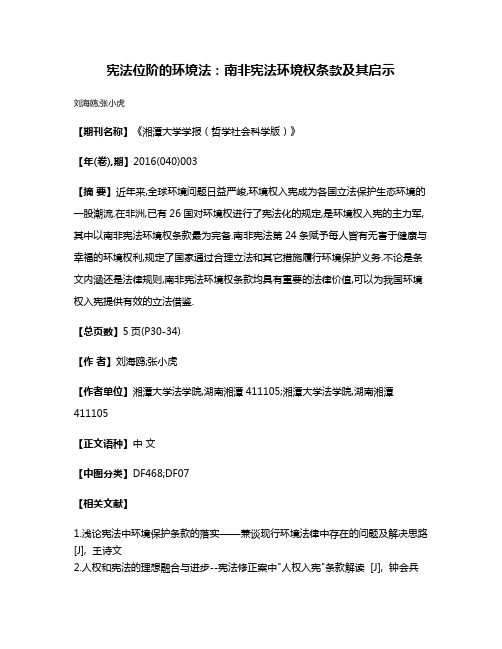
宪法位阶的环境法:南非宪法环境权条款及其启示
刘海鸥;张小虎
【期刊名称】《湘潭大学学报(哲学社会科学版)》
【年(卷),期】2016(040)003
【摘要】近年来,全球环境问题日益严峻,环境权入宪成为各国立法保护生态环境的一股潮流.在非洲,已有26国对环境权进行了宪法化的规定,是环境权入宪的主力军,其中以南非宪法环境权条款最为完备.南非宪法第24条赋予每人皆有无害于健康与幸福的环境权利,规定了国家通过合理立法和其它措施履行环境保护义务.不论是条文内涵还是法律规则,南非宪法环境权条款均具有重要的法律价值,可以为我国环境权入宪提供有效的立法借鉴.
【总页数】5页(P30-34)
【作者】刘海鸥;张小虎
【作者单位】湘潭大学法学院,湖南湘潭411105;湘潭大学法学院,湖南湘潭411105
【正文语种】中文
【中图分类】DF468;DF07
【相关文献】
1.浅论宪法中环境保护条款的落实——兼谈现行环境法律中存在的问题及解决思路[J], 王诗文
2.人权和宪法的理想融合与进步--宪法修正案中"人权入宪"条款解读 [J], 钟会兵
3.宪法与人权保护刍议--兼评第四次宪法修正案中的人权保护一般条款 [J], 陈义华;王蕴慧
4.美、加、日、德、俄五国宪法刑事诉讼条款比较研究——兼对完善我国宪法刑事诉讼条款的启示 [J], 高军;徐宏伟
5.《宪法》就业政策条款对劳动权的保障及其完善——兼议《宪法》劳动权的属性[J], 汪强;于鹏飞
因版权原因,仅展示原文概要,查看原文内容请购买。
- 1、下载文档前请自行甄别文档内容的完整性,平台不提供额外的编辑、内容补充、找答案等附加服务。
- 2、"仅部分预览"的文档,不可在线预览部分如存在完整性等问题,可反馈申请退款(可完整预览的文档不适用该条件!)。
- 3、如文档侵犯您的权益,请联系客服反馈,我们会尽快为您处理(人工客服工作时间:9:00-18:30)。
南非共和国宪法万能之上帝,掌握万邦运命与各民族历史;汇聚吾人来自各地之祖先而予以此土;教之导之,无时或已;免我於危殆,使民永相守,吾人敢不钦遵;今吾等集会於国会,特宣告全国:吾人凛於对上帝与人类所负责任;复深知团结之重要,以保障吾国之完整与自由;以维护法律与秩序;以促进国民之幸福及精神与物质上之利益;愿与举世爱好和平之各民族合作,尽追求和平之责任;并负起建立南非共和国之责,特制定宪法,使适合于本土之传统与历史:为此,南非联邦参议院与从议院,承皇后陛下之批准,订立宪法如后。
目录宪法全文第一章共和国第二章国旗与国歌第三章总统第四章政府第五章国会第一节参议院第二节众议院第三节参议院与众议院之共同规定第四节国会职权第一章共和国第一条南非联邦由好望角、那他尔、特兰斯瓦、奥伦奇自由邦等本宪法未成立前原有之诸省组成,自1961年5月31日起成为一共和国,定名为南非共和国。
第二条南非共和国国民承认上帝之主权与领导。
第三条自第一条规定之日起,凡在宪法成立前订定之法律,而在宪法成立后继续在国会职权内之土地上生效者,其条文内所称之:①南非联邦或国家,应作共和国解释;②王权或国王或王后或总督,视其情形,应作共和国或本国总统之解释;③王在枢密院或王后在枢密院或总督在枢密院,应作本国总统之解释。
第二章国旗与国歌第四条共和国应有国旗,其形式见第五条。
第五条(1)共和国国旗应有三色横条,长宽相等,顶上一条为橘黄色,中间白色,底下蓝色,其中尚有:①中间白色条当中处应嵌有奥伦奇自由邦邦徽,全徽直竖;②在上述奥伦奇自由邦邦徽之两旁:a.在近旗杆之琏应嵌以1927年不列颠联合王国国徽,全幅横置。
b.在离开旗杆之一边,横嵌南非联邦邦徽。
(2)前述a、b两款所嵌两小徽形式大小应相同,宽长之度应与国旗之宽长成比例,即每一徽之宽度应为白色条宽度1/3,b款所示各徽在白色条两旁之距离相同。
第六条定《南非之声》为共和国国歌。
第三章总统第七条(1)总统为共和国之元首。
(2)总统为南非国防军之统帅。
(3)在本宪法规定范围内,总统有下述诸权力:①遵照宪法之规定解散参议院、众议院、或同时解散参众两院;②遵照第二十条与第二十一条之规定任命部长、副部长;③授予荣典;④任命、派遣、接见与承认大使、专使、外交代表及其他外交官员、领事、馆员;⑤遵照本宪法之规定,决定国会会期及休会;⑥凭己意无条件或有条件赦免或缓刑,或取消任何罚款或没收处分;⑦国际会议、条约、协定之加入与批准;⑧宣布或停止戒严;⑨宣战与媾和;⑩在法律秘授权之范围内,总统任命其认为需要任命之官员,并行使及履行宪法与法律所授权之一切权力与职务。
(4)总统除为国家元首外,应并具本宪法生效前属于王后之权力。
(5)在宪法未生效前已存在之宪政惯例,不受本宪法之影响。
第八条(1)总统由选举团选举之。
选举团由参议院及众议院议员全体组成,以南非联邦最高法院院长或其所指派代表为主席,依本条各规定选举总统。
(2)总统选举之日期与地点,由众议院议长或(议长不在时)众议院秘书长决定之,于选举举行之十四日以前正式公告于政府公报。
(3)第一届选举总统之日期应定于1961年5月31日以前,以后各届之选举日期应于现任总统任满日之前三个月至一个月之间内择定一日举行,倘因总统死亡,或因其他原因在任期未届满前缺位时,则总统之选举日期应于缺位之日起三个月内择日举行。
(4)总统或总统候选人,须有足资提名或当选或充任参议院议员所具备之资格。
(5)凡担任薪给来自公库之公职者,当选为总统,应于当选之日,辞去原有公职。
第九条(1)选举团开会之日,选举团主席应先命举行候选人提名。
(2)总统候选人之提名应循规定手续,填报提名单,经选举团团员两人之签名,及被提名为候选人本人之签名,但被提名之候选人倘事先已有书面或电报表示接受提名者不在些限,如被提名人为现任总统,则其提名手续应照第十条第(1)项①款之规办理。
(3)经依(2)项规定正式提名之总统候选人名单,应由选举会主席当场宣布,选举会中不许辩论。
(4)倘在任何选举会中,被提名为候选人者仅有一人,选举会主席应即宣布该候选人已正式当选。
(5)倘候选人不仅一人,应即举行秘密投票,凡选举团会员每人可投一票,得投票总数之过半数者,即由主席宣布正式当选。
(6)①倘无人获得出席选举团投票总数之过半数,则将得票最少数之候选人除名,以余下之候选名单再付投票。
是项办法可视需要继续行之,至一候选人获得投票总数之过半数,宣布此人正式当选为止。
②倘获得最少数票之候选人有二人式二人以上,则选举团应另行投票,其次数视实际需要,以决定此二人或不止二人何人应依照①款之规定先行除名。
(7)①凡遇有:a.被提名之候选人仅二人时;或 b.依照本条之规定经除名之后,只剩候选人二人时。
且该二候选人所得票数相同时,则应依照经八条之规定,另行集会,在另次集会中,仍适用本条各规定。
②倘某项之选举,经已三次集会,而二候选人得票仍相同如本项①款所示之情形时,则该会主席可以投一票。
(8)①众议院议长应为选举团订定选举规则,包括候选人提名手续、主席及其他辅助职员之职掌、办事规举行秘密投票办法等。
②上述规章应予公布,其公布方式由众议院议长视需要决定之。
第十条(1)①总统之任期为七年,自总统遵照第十二条之规定宣誓之日起计算,且非除选举团别有规定者外,任满之后不得再被提名或妆选。
②总统经参众两院在同一会期内决议,认为总统因行为不当,或不能有效执行其职权,而宣布其被免职时,应即停止任职。
(2)①作前述第一项②款两院决议之先,众议院应先有决议并应征得参议院之同意,组织两院联合小组委员会调查其事,参议院与众议院非有两院联合小组委员会之调查报告为审查依据,不得作总统免职之决议。
②除非先有众议院议员三十人以上之联名请求书送达参众院议长处,请求指派两院联合小组委员会调查总统,则众议院不得有决议组织小组委员会之举。
③关于③款所云决议,参众两院均不得作辩论。
(3)总统得以书面辞职书提交众议院议长,再由议长通知总理,即为辞职。
(4)总统非先经政务委员会同意,不得离开共和国。
第十一条倘总统缺位或因其他原因不能执行职务时,参议院议长即代理总统职务,如参议院议长缺位或不能代理时,则由众议院议长代理,又如众议院议长亦缺位或不能代理时,则由政务委员会指派一人为代理总统。
第十二条总统及代理总统应于未就职之先,对南非最高法院首席大法官或大法官举行宣誓,誓词如后:“万能之上帝实鉴之,余某某凛于为民服务受任之重,今接任总统(代理总统),仅此立誓,余必忠于南非共和国,并以至诚恳之心,随时增进人民之福利,排除危害,尽一己之力以为人民,服从、尊重、拥护与维持宪法以及共和国所有法律,完成职务,竭其智识能力,一凭良知,尽力公正,促进吾民之福利。
愿万能之主庇佑,指示余,坚定余,俾余得以信守此拆不渝。
主其佑我“第十三条意图破坏总统或代理总统之尊严或损害其名誉者应为犯罪,得科二千非币以下之罚款或一年以下之徒刑。
第十四条(1)总统除国会随时拨予之津贴及其他特别利益外,应由国库支领每年二万五千非币之薪俸。
(2)总统之薪俸在同一任内不得减削。
第十五条(1)国库应作下述之支付:①凡曾任总统职务者,每年应得退休金六千非币。
②总统遗孀,除卸任以后结婚者外,每年应得总统退休金2/3之养老金。
(2)上述第一项退休金应于:总统卸任之次日开始支付。
②倘为遗孀,则于成为遗孀之日开支付。
(3)1909年南非法第十条虽经第一百二十条所废止,该后段规定应付者仍应继续支付。
第四章政府第十六条(1)共和国行政权之关系内政、外交事务者,属于总统以政务委员会为其辅佐。
(2)凡本宪法各条文规定有关于总统职权之处,均含有总统受政务委员会建议而行之意义,但有他种之明文规定或必然不适用此种解释者,不在此限。
(3)本条第1、2两项之规定,不适用于第二十条关于任命各部部长,或第二十五条、第三十三条第一项①款或第四十七条、或者关总统行使职权之宪政惯例等所规定之总统权力之行使。
第十七条政务委员会由依第二十条规定任命之各部长组成之。
第十八条(1)共和国国玺,内刻国徽,外刻“南非共和国”诸字。
(2)国玺由总统经管,除总统另有规定者外,凡在未行宪以前需用皇玺,南非联邦皇玺、或总督大玺之公文,均改用新玺。
第十九条(1)总统以国家行政首长之地位所表示之意思,应以其签名之文件为之。
其所签署之每一文件,须有一部部长之副署。
(2)总统签字之文件,须依第十八条之规定用玺,以昭慎重。
第二十条(1)总统设立各部,得任命各部部长,主持政府各部事务,人数不得超过十八人。
(2)依照第一项所任命之部长之去留,全凭总统意向,部长在任期间即视为共和国部长。
(3)倘非参议院或众议院议员,或就任部长后成为一院议员,非议员而受任为部长者,其任期不得超过三个月。
(4)倘某部长在故不能行使该部职权时,总统得指派其他政务委员代理之,以代理其全部职权。
或权代理其一部分职务。
(5)部长未就职或未成为政务委员之先,应对总统或其所指派代表作如下之宣誓:“余某某仅此对上帝立誓,效忠南非共和国,尽部长与政务委员之职责,服从共和国宪法与本国法律,尽言尽智,保守秘密,竭一己之忠心与能力,以完成余之职守。
天其佑之。
“(6)1909年南非法第十四条所规定且为本宪法未生效前所成立之各部,应视同本宪法本条所规定正式成立者;又同法第一项规定任命之部长,在本宪法未生效前主持部务者,应视同遵照本宪法规定而正式任命者,然仍须遵照第五项规定先行宣誓,再继续任职。
第二十一条(1)总统得任命副部长,辅助部长执行一部职务,但总数不得多于六人,副部长之任期凭总统之意向为去留,副部长以副部长之名义可代表部长,或执行该部经管事务或法律规定或部长随时交办之事。
副部长非政务委员。
(2)前项所述副部长于未就职之先,应向总统或其指定代表人举行宣誓,誓词由总统规定之。
(3)倘非参议院或众议院议员,或就任副部长后成为一院议员,非议员而受任为副部长者,其任期不得超过三个月。
(4)本宪法未生效前,依1909年南非法第十四条第三项规定任命之副部长,应视同照本宪法本条规定正式任命者,并应继续宪法未生效前南非法所赋予之权利与职责,一如部长依本宪法赋予之权力所委托者,此等副部长仍应遵照第二项之规定举行宣誓。
第二十二条共和国公职人员之任命与解职权属于总统,大宪法或其他法律或总统将任免权另行付托其他机构者,不在此限。
第二十三条除第二十七条之特殊规定外,共和国政府所在地定于普利托里亚。
第五章国会第二十四条(1)共和国之立法权属于共和国国会,共和国国会包括总统、参议院及众议院。
(2)1909年南非法所成立之参议院与众议院,至本宪法生效之日尚存在者,应视同遵照本宪法之规定正式成立之立法机构,原任议员应视同经遵照本宪法之规定正式推选产生者,但各该议员仍应遵照第五十二条所规定举行宣誓,再行就职。
